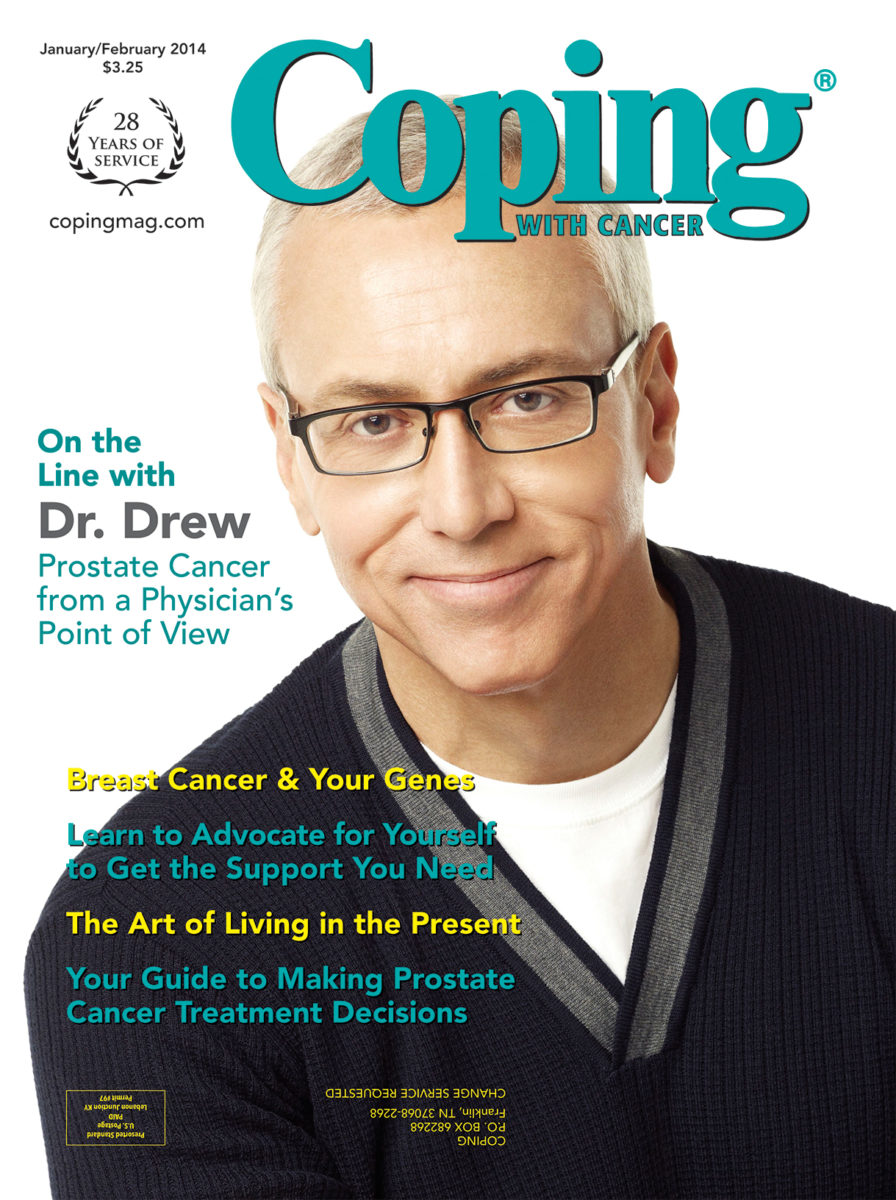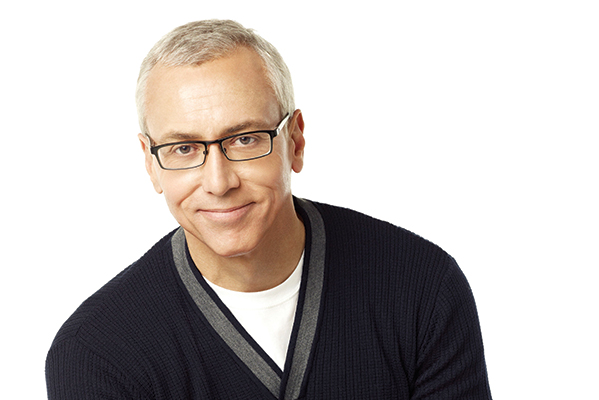On the Line with Dr. Drew
Prostate Cancer from a Physician’s Point of View
by Jessica Webb Errickson
Board-certified internist, addiction medicine specialist, and TV and radio personality Dr. Drew Pinsky’s career has centered on helping others. He’s given relationship advice on his long-running radio show Loveline, helped people overcome addiction on VH1’s Celebrity Rehab with Dr. Drew, and he shares his insights into human behavior on HLN’s Dr. Drew On Call. Now after recovering from a radical prostatectomy, Dr. Drew is sharing his experience with prostate cancer to help other men facing the same diagnosis.
Dr. Drew was diagnosed with early-stage prostate cancer in 2011 after his wife urged him to see a doctor for a check-up. He learned that his PSA level had risen from a 1.5 to a 4 – still in the normal range but a significant jump none-the-less – and the central lobe of his prostate gland was slightly enlarged. His urologist initially began treating him for prostatitis (inflammation of the prostate), but Dr. Drew’s PSA remained elevated and his doctor began to suspect there might be more going on than just inflammation. So he ordered a biopsy to check for cancer.
All the while, Dr. Drew was thinking that a biopsy was overkill. But his urologist’s intuition was spot-on, as the biopsy revealed a low-grade tumor. Dr. Drew had prostate cancer.
“My story is a good example of a physician’s judgment,” Dr. Drew tells Coping® magazine. “It was my internist’s judgment or intuition that I should see the urologist. It was my urologist’s judgment that I should be biopsied. Based on current guidelines, they would have taken a much more conservative approach.”
With a family history of prostate cancer – his father and uncle both had the disease – Dr. Drew figured he would eventually come face to face with cancer himself. But he didn’t expect it to happen to him in his early 50s. He certainly found the diagnosis disturbing; however, as a doctor, he knew there was no need to go into panic mode.
“I guess when physicians get a diagnosis of cancer, it’s a little different,” he explains. “We know how to put it in the context of what kind of cancer we have. I knew I could wait a while [to begin treatment], so I was planning to wait until I finished this incredible flurry of activity.”
Dr. Drew’s diagnosis came during what he considered one of the busiest periods of his life.
“I was doing the daytime show Lifechangers. I had just started working at HLN. I was doing a season of Rehab with Dr. Drew,” he elaborates. “There was just so much going on.”
He and his doctor agreed to take the conservative path of active surveillance and monitor the tumor for growth rather than jump into treatment right away. But after a year of watchful waiting and two more biopsies, his doctor was no longer comfortable with the passive route. The tumor’s volume was becoming a concern, and he believed Dr. Drew’s prostate needed to be removed.
Trusting his doctor’s instincts and knowing that surgery was the best option for his particular case, Dr. Drew carefully chose a surgeon and proceeded with radical robotic prostatectomy in July 2013.
Once again, he notes that his doctor’s judgment was on point, as his prostate was removed just before the cancer had a chance to spread.
“Lo and behold, there was a tiny tributary of tumor that was just within millimeters of the capsule,” he says. “You couldn’t see that on a biopsy.”
Overall, the surgery was a complete success, leaving Dr. Drew with no discernible side effects. And while he admits that recovery was brutal, he managed to get back to work only 10 days after the surgery.
Though he didn’t immediately go public with his cancer diagnosis, Dr. Drew always knew he would ultimately share his story.
“My whole reason for being in the media is to help people with things like this,” he says, “but I wanted to make sure it was a good story before I came out with it.”
Now that he is sharing his story, Dr. Drew’s goal is to reduce men’s anxieties about prostate cancer – from anxiety about being tested to the anxiety of facing treatment.
“There are many options [for treating early-stage prostate cancer], and you can generally take your time after diagnosis and select the best option for your particular circumstance,” Dr. Drew advises. “You do not have to rush. You should not rush. Although I’ve had a great outcome from prostatectomy, it’s intense. I really got a sense of why you’d want to pursue watchful waiting until surgery was absolutely necessary.”
More from Coping’s conversation with Dr. Drew
Did you find it difficult to transition from the role of doctor to patient?
I don’t think so. I think if anything, I was a little too cavalier given how brutal the surgery really was. I also found that I was not good at asking for help, which I guess doctors all kind of suffer from.
Now that you’re cancer-free, do you ever find yourself worrying about recurrence?
Now more than ever I’m having those kinds of thoughts. You worry about the possibility. It’s all going so well, but it’s like I’m waiting for the other shoe to drop. I hope it keeps going very well. After all I’ve been through, I don’t want to end up with more trouble.
Has having cancer changed your outlook?
I was always curious about how people dealt with terminal diagnoses and how they kept moving on. When it was not clear what was going to happen with my cancer, I started wondering “what if,” but I just kept pushing forward. You don’t think about the trouble ahead; you just think about putting one foot in front of the other.
After opening up about his diagnosis, Dr. Drew says the media interest in his story was extraordinary, even overwhelming. So much so, that he experienced some slight setbacks in recovery. But now he has healed from surgery, and he’s getting back to a normal pace of life (or at least what’s considered normal for Dr. Drew). “I’m still doing my show on HLN four nights a week, still hosting Loveline and doing podcasts. I still see patients,” he says. “And I’m getting more involved with prostate cancer than I ever thought I would!”

Keep up with Dr. Drew at DrDrew.com and on twitter.com/drdrew.
This article was published in Coping® with Cancer magazine, January/February 2014.


